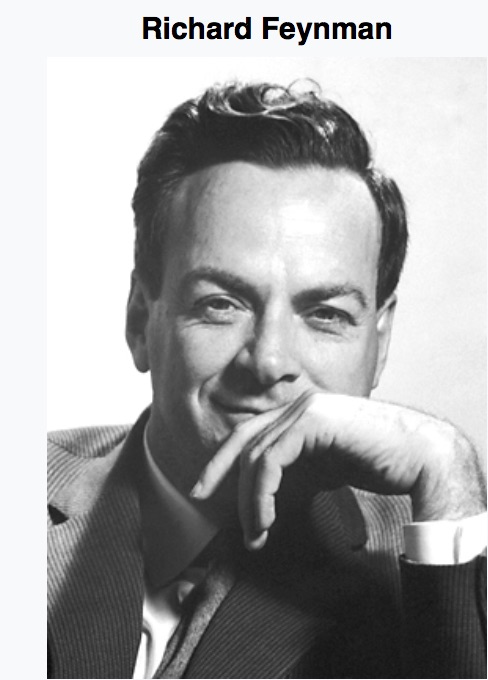
Yes, they met only once and it was in the early 1940s at a seminar organized by Eugene Wigner. The physicists invited to this seminar read like a Who’s Who? of top theoretical physicists of the time. It included John von Neumann, Wolfgang Pauli, and Albert Einstein who was at the Institute for Advanced Study in Princeton. Feynman was a budding young physicist, doing graduate work at Princeton as John Wheeler’s research assistant. He and Wheeler had resolved some issues concerning the exchange of energy during the interaction of electrons, and Wheeler suggested that Feynman present their results in the seminar so that he could acquire some experience in giving presentations.
In his autobiographical book, Surely You’re Joking, Mr. Feynman! written 40 years later, Feynman recalled that dramatic encounter: (pp. 65-66)
[Before my lecture was about to begin] I was writing these equations all over the backboard ahead oftime, Einstein came in and said pleasantly, “Hello, I’m coming to your seminar. But first, where is the tea?” I told him, and continued writing the equations.
Then the time came to give the talk, and here are these ‘monster minds’ in front of me, waiting! My first technical talk–and I have this audience! I mean they would put me through the wringer! I remember very clearly seeing my hands shaking as they were pulling out my notes from a brown envelop.
But then a miracle occurred, as it has occurred again and again in my life, and it’s very lucky for me: the moment I start to think about the physics, and have to concentrate on what I’m explaining, nothing else occupies my mind–I’m completely immune to being nervous. …
But then the end of the seminar came, and it was time for questions. First off, Pauli, who was sitting next to Einstein, gets up and says, “I do not sink dis teory can be right, because of dis, and dis, and dis,” and he turns to Einstein and says, “Don’t you agree, Professor Einstein?”
Einstein says, “Nooooooooooooo,” a nice, German-sounding “No”–very polite. “I find only that it would be very difficult to make a corresponding theory for gravitational interaction” He meant for the general theory of relativity which was his baby… Einstein appreciated that things might be different from what his theory stated: he was very tolerant of other ideas.
Einstein and Feynman never met again because Einstein was in the sunset of his career and Feynman was in his early years of exploration. This Einstein-Feynman encounter, in which the old authorities pass the torch to the next generation, is captured in Max Planck’s observation, “Science advances one funeral at a time.”
